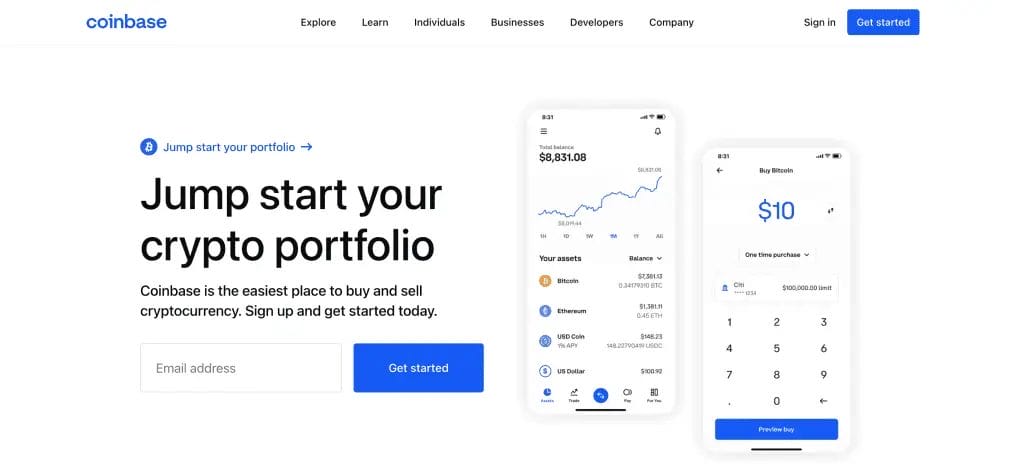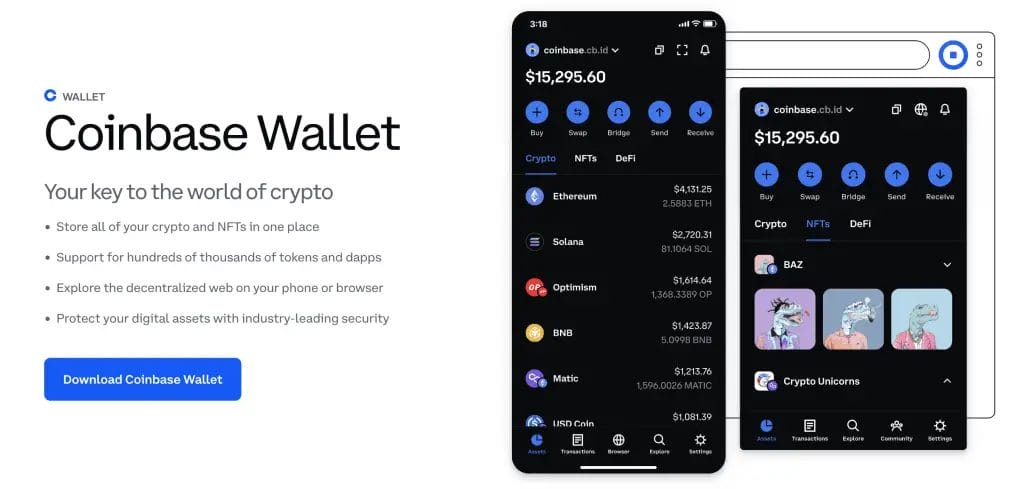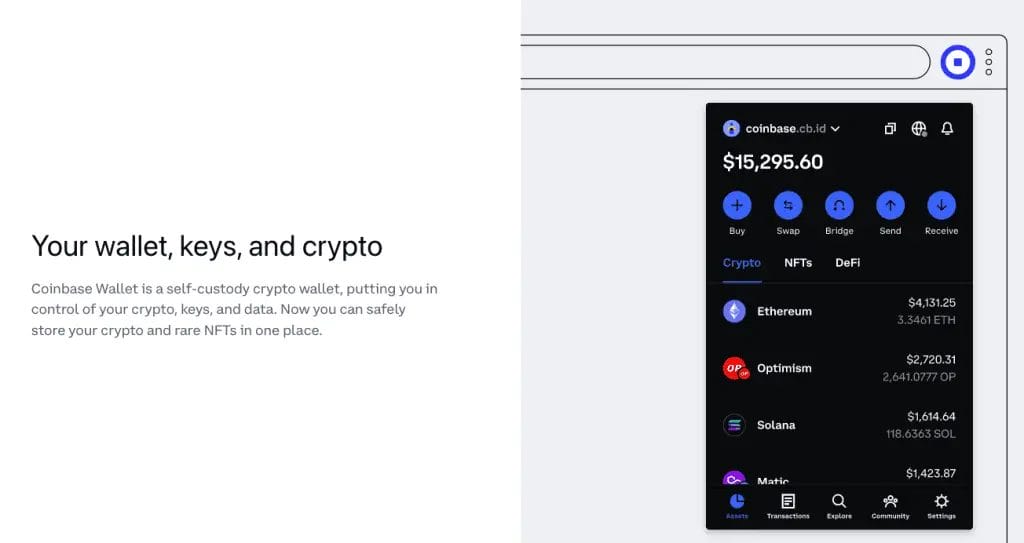In this article, we’ll take a deep dive and compare Coinbase vs Coinbase Wallet and how they differ in terms of security, fees, insurance, and usability.
If you’re interested in crypto, you have likely used or heard of Coinbase and Coinbase Wallet. While both products are from the same company, they serve different purposes and are not the same. Many people often confuse the two, leading to the question: “What is the difference between Coinbase and Coinbase Wallet?“.
So, if you’re wondering which Coinbase product is best for you, keep reading to find out.
What is Coinbase?
Coinbase.com is one of the largest centralized cryptocurrency exchanges that was launched in the US in 2012 by Brian Armstrong and Fred Ehrsam. The popular exchange supports over 170 crypto assets and fiat currencies such as the US dollar, GBP and Euros.
One of Coinbase’s major selling points is its user interface, making it ideal for beginners getting into the crypto space. However, Coinbase offers Coinbase Advanced Trade for more advanced traders, previously known as Coinbase Pro.
Although Coinbase is well known as a crypto trading platform, it also offers many other popular features. One of their recent features is Coinbase Earn, where you can stake and earn interest on your crypto. Plus, Coinbase Learning Rewards, where users can earn free crypto for learning about tokens and projects and answering a few simple questions.

Coinbase provides custodial storage, meaning the platform holds your funds in a custodial form. The platform also uses the KYC (Know Your Customer) process for its custodial model, requiring users to verify their identity to use the exchange and its custodial storage. Although this means Coinbase holds your private keys, the platform is responsible for ensuring the safe storage of your sensitive information. However, users must keep their passwords safe, protect their accounts with 2FA, and take security precautions.
If you plan to store funds for a long time, using a separate non-custodial crypto wallet that you have control over may be better. Coinbase Wallet is a mobile application that allows users to store digital assets and take control of their private keys. The Coinbase Wallet gives users total custody of their assets and puts them in the driver’s seat.

What is Coinbase Wallet?
Unlike Coinbase, which only supports around 170 assets, Coinbase Wallet supports thousands of cryptocurrencies, including ERC-20 tokens such as Tether and Shiba Inu. Bitcoin, Bitcoin Cash, Solana, Litecoin, and other popular cryptocurrencies are also supported. Coinbase Wallet also allows users to store non-fungible tokens (NFTs), including ERC-721 and ERC-1155 tokens.

Coinbase Wallet offers a four-digit security PIN that must be entered for all future logins to ensure the security of users’ funds. Two-factor authentication (2FA) is also available, which requires additional verification from a separate device or account, such as email or text. The Coinbase Wallet interface is user-friendly and easy to navigate, making it suitable for all levels of crypto investors.
While Coinbase Wallet is a secure option for private key storage, users should be aware of potential security vulnerabilities. As a software wallet, it requires an internet connection, making it vulnerable to remote attacks.
Unlike a hardware wallet that stores private keys in cold storage on an offline device, software wallets keep private keys in a hot wallet, which is more susceptible to hacking attempts. However, this does not mean that software wallets are inherently unsafe, and Coinbase Wallet provides robust security measures to protect user funds.
One notable feature of Coinbase Wallet is that users can use it without providing their email address, ensuring anonymity for those who prioritize privacy.
Overall, Coinbase Wallet is a reliable and easy-to-use self-custody cryptocurrency wallet that supports a wide range of digital assets and NFTs while giving users complete control over their investments.
Coinbase Vs Coinbase Wallet
Coinbase is a centralized exchange where users can buy, sell and trade cryptocurrencies. The Coinbase Wallet, on the other hand, is a non-custodial software wallet allowing users to store their private keys and manage their crypto assets independently.
But which platform from Coinbase should you use? To help you decide, we have broken down the key differences between both products to help you get a better understanding when comparing Coinbase vs Coinbase Wallet.

Coinbase:
- Coinbase is a centralized cryptocurrency exchange that allows users to buy, sell, and trade cryptocurrencies.
- It supports over 60 cryptocurrencies, including Bitcoin, Ethereum, and Litecoin.
- Coinbase charges fees for buying and selling cryptocurrencies, which vary depending on the payment method.
- Coinbase provides users with a custodial wallet, meaning that the exchange holds onto users’ private keys on their behalf.
- Coinbase is a regulated exchange that complies with regulations, including Know Your Customer (KYC) and Anti-Money Laundering (AML) laws.
Coinbase Wallet:
- Coinbase Wallet is a non-custodial crypto wallet that allows users to safely store their recovery phrase and manage their cryptocurrencies independently.
- Coinbase Wallet supports thousands of cryptocurrencies, including ERC-20 tokens and NFTs.
- Coinbase Wallet is entirely virtual, as it is a software wallet that can be accessed via desktop using a browser extension or mobile app. Users can also connect a hardware wallet.
- Coinbase Wallet charges no fees for using the wallet.
- Users are responsible for safely storing their digital assets as Coinbase Wallet is non-custodial.
- Coinbase Wallet offers various security features, including a four-digit security PIN and two-factor authentication.
- The Coinbase Wallet interface is straightforward and easy to use.
Do You Need a Coinbase Account to Use Coinbase Wallet?
If you’re interested in trying Coinbase Wallet but want to use something other than the Coinbase exchange, you may wonder if you need a Coinbase account to use the Coinbase Wallet.
The good news is that you do not need a Coinbase account to use Coinbase Wallet. Although the same company owns them, they are separate services that can be used independently.
While Coinbase Wallet can be used without Coinbase.com, it is worth noting that Coinbase does connect to Coinbase Wallet for fund transfers. However, Coinbase.com also allows transfers to other wallets such as MetaMask, Trust Wallet, Exodus, and Ledger. Therefore, using Coinbase Wallet may not necessarily streamline your experience on Coinbase.com, but it is a secure option for storing your private keys.

Is Coinbase Wallet Safer than Coinbase?
Coinbase Wallet and Coinbase both have their own unique security features. Coinbase Wallet gives users total control of their private keys, allowing them to store their crypto assets securely. On the other hand, Coinbase.com offers custodial storage, which means that Coinbase holds users’ funds in a custodial form.
This means that Coinbase is responsible for safely storing users’ sensitive information, such as private keys. Users must take security precautions, such as using strong passwords, enabling 2FA, and keeping their accounts secure.
Both Coinbase and Coinbase Wallet offer strong security measures, but the level of security ultimately depends on the user’s requirements. Users must understand the risks of storing cryptocurrency and take necessary precautions to keep their assets safe.

Conclusion
Now we have learned about Coinbase vs. Coinbase Wallet, which one should you use?
Honestly, it’s difficult to say which Coinbase product you should use over the other. It’s important to consider your needs and preferences. If you want to buy, sell, and trade cryptocurrencies easily and don’t mind paying fees, Coinbase might be the better option. However, if you prioritize the security and control of your crypto assets and want to store a wide variety of cryptocurrencies, Coinbase Wallet may be a more suitable choice.
However, both Coinbase and Coinbase Wallet work well in conjunction with each other, so you don’t necessarily need to pick one over the other, as both products have pros and cons.
To learn more about Coinbase or the Coinbase wallet, check out our detailed Coinbase Wallet Review and Coinbase Exchange Reviews.
FAQs
Is Coinbase and Coinbase Wallet the same?
No, Coinbase and Coinbase Wallet are not the same. Coinbase.com is a centralized cryptocurrency exchange that allows users to buy, sell, and trade cryptocurrencies. Coinbase Wallet is a non-custodial mobile wallet application that enables users to store, manage, and control their crypto assets.
Should I move my crypto to a wallet?
It depends on your personal preference and the amount of crypto you own. If you own a significant amount of cryptocurrency, moving it to a wallet is generally recommended for increased security and control over your private keys.
On the other hand, if you are a beginner and own a small amount of cryptocurrency, keeping it on a reputable exchange like Coinbase may be more convenient and practical. However, it is important to note that exchanges are centralized and, therefore, are susceptible to hacking and other security breaches.
Is it free to transfer from Coinbase to Coinbase Wallet?
Coinbase doesn’t charge a fee to transfer from Coinbase to Coinbase Wallet, but you may pay a network transaction fee depending on the cryptocurrency being transferred.
How do I get a Bitcoin wallet online?
Setting up an online Bitcoin wallet is an easy and accessible way to start using Bitcoin. Once you’ve chosen, visit their official website to create an account. This typically involves providing an email address and setting up a strong password. For added security, enable two-factor authentication (2FA).
After setting up your account, you’ll be given a recovery phrase. This is a crucial step as the phrase can help you regain access to your wallet if you ever lose it, so make sure to write it down and store it in a safe place.
Your online wallet will allow you to receive Bitcoin by sharing your wallet address with others, and you can send Bitcoin to others by entering their address and the amount you wish to send.
Remember, the key to using your online Bitcoin wallet safely is to maintain good security practices, such as logging out after each session and being cautious of phishing scams. While online wallets offer great convenience, they do come with risks, so it’s important to use them wisely and keep your recovery phrase secure to protect your digital assets.
Related Posts
- How to Withdraw from Coinbase to a Wallet
- How to Find Your Coinbase Wallet Address
- How to Close & Delete a Coinbase Account
*After you make a crypto purchase, BTC will be added to your portfolio. Limited time offer. Offer available to new users only. Offer not available to new users who were referred to Coinbase through the Referral Program or who have previously opened an account using the different contact information. Coinbase may update the conditions for eligibility at any time.
“Cryptocurrency is not regulated by the UK Financial Conduct Authority and is not subject to protection under the UK Financial Services Compensation Scheme or within the scope of jurisdiction of the UK Financial Ombudsman Service. Investing in cryptocurrency comes with risk and cryptocurrency may gain in value, or lose some or all value. Capital gains tax may be applicable to profits from cryptocurrency sales.”


